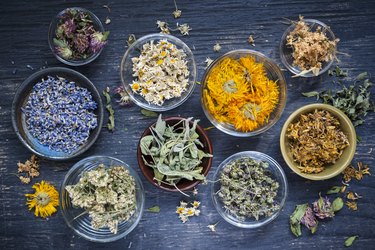
Eating tea leaves isn't a good idea, because you're more likely to ingest any contaminants present in the tea. However, drinking infusions of black, green, white and oolong tea is associated with many health benefits.
Tip
It's best to avoid eating tea leaves due to the content of heavy metal contaminants. Instead, drink brewed tea.
Video of the Day
Eating Tea Leaves
An October 2013 study published in the Journal of Toxicology measured heavy metal contaminants, such as lead, aluminum and mercury, in tea leaves and brewed tea. The results showed that some metals are bound to the tea leaves in such a way that they don't make it into the infusion of brewed tea. Of the 30 samples of tea leaves tested, 18 contained mercury, but none of the brewed tea samples had detectable levels of the toxic metal.
Video of the Day
In the Journal of Toxicology study, all tea samples contained significant amounts of aluminum, ranging from 568 to 3,287 nanograms. Even the organic tea samples had contaminants.
All brewed teas also has detectable aluminum levels. The teas steeped for 3 minutes contained 1,131 to 8,324 micrograms, while the teas steeped for 15 minutes contained 1,413 to 11,449 micrograms. (Bear in mind that there are 1,000 nanograms in 1 microgram.)
This indicates that tea leaves contain much higher levels of contaminants than brewed tea. The findings also show that allowing tea to steep for a longer time results in greater levels of contaminants in the tea. It's best to limit brewing time to 3 minutes.
The study only analyzed samples of non-herbal teas. It's reasonable to assume that analyses of herbal teas, such as yerba mate, would yield similar results.
In light of the study's findings, avoid using tea leaves as food. Adding tea leaves to smoothies also isn't advisable.
Different Kinds of Tea
Green, white, oolong and black tea come from the same plant — Camellia sinensis, states the American Institute for Cancer Research. Tea is growing in popularity, a trend possibly fueled by its purported benefits.
Herbal teas are derived from the roots, leaves, flowers and seeds of other plants. While herbal teas might contain beneficial ingredients, they haven't been researched enough to draw conclusions about any health benefits, says Harvard Health.
Read More: The Best Green Tea to Lose Weight
The four varieties of Camellia sinensis are harvested in the same way. Differences in the teas are due to the manner in which they're processed.
To make black tea, the leaves are crushed and torn, and then allowed to oxidize, the process that causes browning, explains Harvard Health. When making green tea, the leaves are heated or quickly steamed to prevent the oxidation process. The Journal of Toxicology study describes oolong tea as having a level of oxidation between green and black tea. White tea consists of young tea leaves that are withered and baked dry.
All four kinds of tea contain caffeine, an array of antioxidants, an amino acid called L-theanine and the minerals manganese and fluoride.
Benefits of Tea
For centuries, tea has been enjoyed and revered by cultures around the world. According to the Academy for Nutrition and Dietetics (AND), research backs some of the health benefits associated with the beverage.
The most robust evidence is linked to heart health. Studies show black tea reduces the incidence of heart attacks, while green tea is tied to lower total cholesterol, bad cholesterol and triglyceride levels, as well as higher good cholesterol levels.
Read More: 10 Everyday Ailments Soothed by Tea
Evidence of cancer-preventing effects isn't as strong, but studies suggest the antioxidants in green tea called catechins may be of value for the disease. Research on black tea's cancer-fighting effects is inconsistent.
Other limited investigations suggest tea may help prevent tooth loss and promote weight management, notes the AND.
Harvard Health advises consumers to avoid bottled teas, which contain high amounts of sugar. Stirring a little sugar into tea is fine, but adding excessive amounts will likely cancel out the possible benefits.
- Journal of Toxicology: "The Benefits and Risks of Consuming Brewed Tea: Beware of Toxic Element Contamination"
- American Institute for Cancer Research: "Tea"
- Harvard Health Publishing: "Flavonoids: The Secret to Health Benefits of Drinking Black and Green Tea?"
- Academy for Nutrition and Dietetics: "The Health Benefits of Tea"
Was this article helpful?
150 Characters Max
0/150
Thank you for sharing!
Thank you for your feedback!